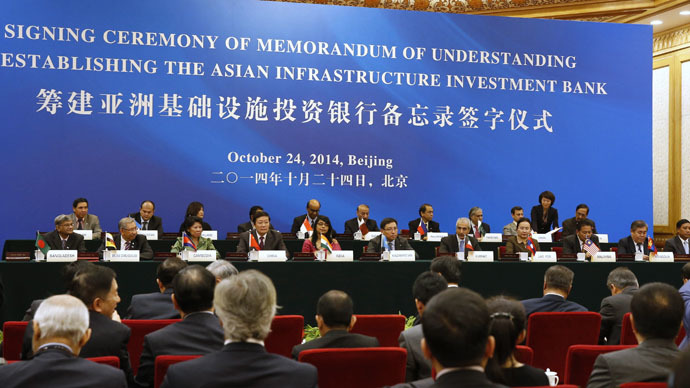Britain’s membership in China-led World Bank rival of ‘UK national interest’ - spokesman

The UK government considers membership of the China-led Asian Infrastructural Investment Bank (AIIB) of British national interest. However, the decision was given the cold shoulder by the US which sees the AIIB as rival to the Western financial system.
"There will be times when we take a different approach (to the United States)," as Reuters quotes a spokesman for Prime Minister David Cameron as saying Friday, referring to the decision to join the bank. "We think that it's in the UK's national interest."
On Thursday the UK applied to become the first Western founding member in the AIIB, with the UK Chancellor of the Exchequer George Osborne assuring that its policy is transparent and it has an essential part in providing finance for Asian development.
"Joining the AIIB at the founding stage will create an unrivalled opportunity for the UK and Asia to invest and grow together," Osborne said.
The UK Treasury rejected the idea that Britain’s decision was spontaneous, adding that there had been “at least a month of extensive consultation” at the G7 level, and even that US Treasury Secretary Jack Lew participated in the negotiations.
READ MORE: Marco Polo in reverse: China pledges $40bn for new Silk Road
However, the decision saw a prompt reaction from the US, said the FT on Thursday referring to an unnamed senior US official who expressed concern over the British decision being taken after "virtually no consultation with the US.”
"We are wary about a trend toward constant accommodation of China," the FT quoted the US official as saying.
AIIB was founded in October 2014 by China and 20 other Asian countries, including India, Singapore, Vietnam, and Kazakhstan. China expects to officially launch AIIB by the end of next year. The bank will allocate money for the development of roads system, telecommunication and other infrastructure projects in the poorer regions of Asia. At the initial stage AIIB will focus on creating a ‘New Silk Road’ that will include a number of trade routes to Europe.
Asia gaining momentum
The establishment of AIIB initially proposed by Chinese President Xi Jinping is a key tool in China's efforts to increase its influence in the region. In addition to the AIIB, China is the driving force behind last year’s creation of a BRICS New Development Bank and is promoting a $40 billion Silk Road Fund to finance economic integration with Central Asia.
READ MORE: China launches new World Bank rival
The bank is aimed at creating an alternative for Western financial institutions and increase competition in the region, since Asia already has a major lender the Asian Development Bank. Japan, China’s major rival in the region, is the biggest shareholder in ADB along with the US.
The idea of creating a bank to rival the Asian Development Bank has caused resistance from the United States, which called for its allies to stay away from the AIIB.
Japan, Australia and South Korea haven’t announced their decisions, while the Australian media reports that Washington has put pressure on Canberra not to participate.
South Korean Vice Finance Minister Joo Hyung Hwan told reporters on Thursday that his country is still discussing the possibility of membership with China and other countries.
Changing attitude to China
In 2013 during a visit to Beijing George Osborne said he wanted to “change Britain’s attitude to China.”
The issue of bonds in yuan by the UK government in October 2014 was the first by a Western government. The desire to establish the City of London as a platform for overseas business in the yuan also proves Britain’s willingness to foster stronger commercial relations with China.
READ MORE: London to become Chinese offshore banking center
However, the pursuit of broader cooperation has seen a negative reaction coming from US, as it fears the rapidly developing Asian economies, primarily China, could challenge Washington-based global institutions.
The relationship between the US and UK have been at the core of Western policy for decades, although they’ve recently become tense over the UK’s cut in defense spending that could soon drop below the 2 percent of GDP target set by NATO.












